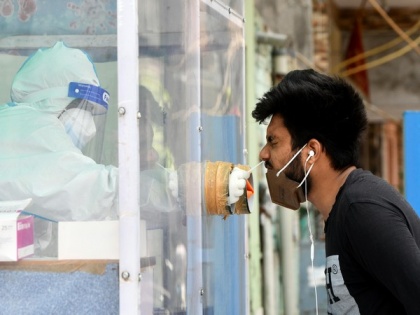At least one coronavirus case among social network of 31 pc Indians: Survey
By ANI | Published: August 5, 2020 08:30 PM2020-08-05T20:30:12+5:302020-08-05T21:45:39+5:30
Around 31 per cent of people have at least one COVID-19 positive case in their social network like family, extended family, friends, colleagues and neighbours, revealed a survey conducted by social media community platform -- LocalCircles.

At least one coronavirus case among social network of 31 pc Indians: Survey
Around 31 per cent of people have at least one COVID-19 positive case in their social network like family, extended family, friends, colleagues and neighbours, revealed a survey conducted by social media community platform -- LocalCircles.
The survey was done to get citizen responses about the extent of the spread of COVID-19 in India.
About 35,000 responses were received across 269 districts of India. 67 per cent of respondents were men while 33 per cent of them were women.
Responding to the first question if they had family members including extended family, friends, colleagues and neighbours who have tested positive for COVID-19, 31 per cent of citizens answered "yes" while 65 per cent of them responded "no".
India has crossed 1.6 million cases for COVID-19 and within 60 days, the daily caseload has moved from 4,000 per day to almost 50,000 per day now.
When asked if they believe India is on the right track as far as the handling of containment of COVID-19 is concerned, only 51 per cent of respondents answered in an affirmative while 39 per cent of them answered in a negative, stated the survey's findings.
According to LocalCircles, India is just behind the United States and Brazil in the number of COVID-19 cases.
India is now adding over 50,000 cases per day, standing just behind the United States in the highest number of cases reported by any country in 24 hours.
In the LocalCircles survey conducted in early July, 69 per cent of citizens indicated that a complete one-month lockdown must be implemented in such high load districts and that weekend lockdowns were not effective.
India currently has more than five lakh active COVID-19 cases and over 10 lakh patients have already recovered from the infection. The countrywide death toll has crossed 39,000. Globally, over 17 million people have been infected with the virus.
In the third question, citizens were asked how India can significantly reduce its cases and 10 per cent of respondents said it could be done through strict localised lockdowns while 19 per cent of them suggested extensive tracking and testing.
About 58 per cent of respondents said both of these will have to be done together while 11 per cent of respondents feel the government cannot do anything to significantly reduce the number of cases.
After the metros, the infection has now begun spreading to smaller towns and rural areas as governments eased restrictions in June and July.
In the final poll, citizens were asked with the current containment and where do they expect India to be by December 31 this year.
At least 17 per cent of respondents said they believe there will be two to four million cases, 19 per cent of respondents said there could be four to eight million cases, while 27 per cent of respondents stated there could be eight to 12 million cases.
16 per cent of respondents said there could be over 12 million cases in India by December 31.
"This shows that 43 per cent of citizens believe that India will cross at least eight million COVID-19 cases by the end of this year. Though India has been steadily increasing its COVID testing rates, it still has a testing rate of 11.8 tests per thousand people, compared to 152.98 of the US," said LocalCircles in the survey.
Sachin Taparia, CEO of LocalCircles said, "The silver lining, however, is that cases in Delhi, Mumbai and Chennai are declining over the last 30 days. The risk, however, is that as the virus spreads in smaller towns, leading to more COVID-19 patients coming to metros for treatment given the inadequate health infrastructure in most towns and villages to handle such a pandemic, the metros could possibly experience a second wave."
( With inputs from ANI )
Open in app